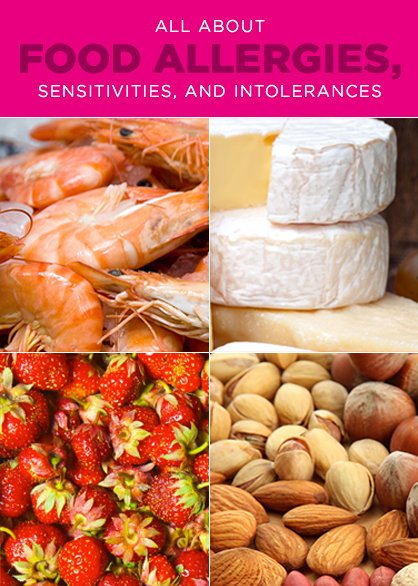Food allergy or intolerance or sensitivity?
Understanding what you can't eat and why
The difference between a true food allergy, versus an intolerance or sensitivity, can be confusing. Sometimes, people don’t even know how their body is reacting to something, and whether they should eliminate it from their diet.
Find out how to determine what your body’s reaction really means.


Christina Major, a holistic nutritionist, said, “There is a huge difference between all the food issues in today's society. They go far beyond just allergies and intolerance.”
“An allergy involves the immune system, an intolerance inflames the digestive system. A sensitivity may affect a person or not, depending on the circumstance. Then there are palatability issues. For some people, the very taste of texture of a food can cause an immune response or an inflammation response. Yeast is also a contributor to gut problems, yet no food allergy or intolerance can be found. Since yeast problems in the gut can affect the skin, mouth and genitals, food can cause things like eczema or tooth decay to worsen,” Major said.
Dr. Bradley Chipps, a board-certified allergist, explained the difference in clinical terms. “Allergy is when there is a defined IgE mediated molecule that can be measured either by a blood specific allergy blood test or skin test. Just because you have this IgE molecule does not mean you're going to react to a particular allergen, but it means you're at higher risk to react.
“Intolerance can be a direct effect on the gastrointestinal tract that can be seen, for example, in people who are lactose intolerant and don't digest milk very well because they can't break down the lactose. It's not an allergy. It just means they're intolerant to milk because they have lactose intolerance.”
He continued, “Sensitivity can mean something as simple as a particularly greasy food causing you to have upset stomach or nausea or hot, spicy foods causing you to sweat, and that has nothing to do with allergy.”

With a food allergy, symptoms appear immediately upon consumption due to the IgE antibodies. Food intolerances and sensitivities cause a different reaction, the production of IgG antibodies in the immune system. Symptoms are less intense and usually appear 12-48 hours after consumption. Heartburn, headaches, difficulty getting out of bed in the morning, looking tired even after sufficient sleep, an inability to lose weight, bloating and relentless water retention can all be related to food sensitivities or intolerances.
The most common allergens in food are peanut, tree nuts, milk, egg, wheat, soy, fish and shellfish, according to Food Allergy Research & Education (FARE). The only way to accurately determine a food allergy is through a skin-prick test, a blood test, an oral food challenge or a trial elimination diet. The ones your physician chooses will be based on your medical history and initial test results.
Many people don’t even know they’re sensitive or intolerant to a food until the problematic foods are removed from their diet. Suddenly it’s easier to get out of bed, they have more energy, and mood and concentration improves as joint pain, headaches and sinus congestion disappear.
Typical food intolerances and sensitivities include a reaction to dairy products, alcohol, wheat, gluten, yeast and histamines, such as those found in fermented drinks such as Champagne, wine and beer as well as soy sauce, aged cheeses and sauerkraut.
Symptoms associated with food intolerances and sensitivities
Digestive:
- Gas
- Bloating
- Abdominal cramping
- Loose stools
- Indigestion or heartburn
- Constipation
- GERD (reflux)
- Blood in the stool
- Lactose intolerance
- Inflammatory bowel disease
- Irritable bowel Syndrome
Skin:
- Eczema
- Psoriasis
- Acne
- Hives
Mental/Emotional:
- Irritability
- Anxiety
- Depression
- Food cravings
- Insomnia
General:
- Joint pain or stiffness
- Arthritis (rheumatoid)
- Fatigue
- Difficulty getting out of bed in the morning
- Headaches
- Migraines
- Malaise
- Weight gain
- Water retention
- Puffy eyes
- Dark under-eye circles
- High blood pressure
- Cellulite
- Difficulty losing weight
Nasal/Immune system:
- Sinus congestion
- Ear congestion
- Post-nasal drip
- Seasonal allergies
- Hay fever
- Asthma
- Chronic ear infections
- Itching in the ears
- Itchy mouth
- Runny nose
- Watery eyes
- Sneezing
A food elimination diet, such as one done after a cleanse, is a great way to determine how your body reacts to certain foods. Some items, such as corn, tomato and mushrooms, can cause unexpected reactions and weight gain. Uncovering what your body’s best fuel is can go a long way toward improving health and vitality.


